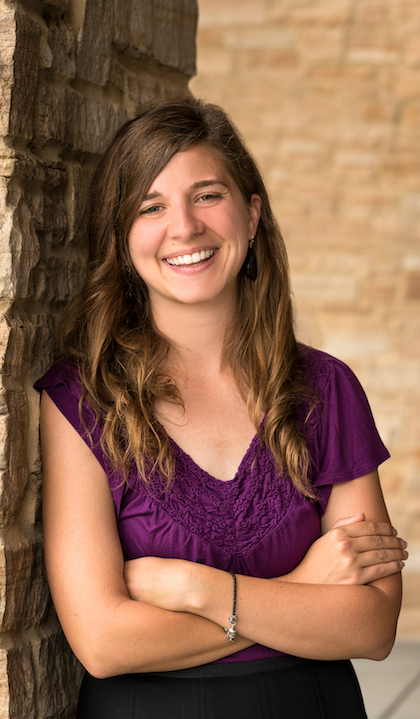Can Happiness Help Prevent HIV? Global Health Alumna Shines Light on Research Opportunity
Despite setbacks, recent alumna perseveres to successfully publish in the Journal of Refugee & Global Health 15 months after graduation.
 When offered the option of taking an oral comprehensive exam or producing a publishable
manuscript as the cumulative test for her Master of Public Health degree, Janine Foggia,
‘16, jumped at the opportunity to produce “something tangible” to put on her resume.
When offered the option of taking an oral comprehensive exam or producing a publishable
manuscript as the cumulative test for her Master of Public Health degree, Janine Foggia,
‘16, jumped at the opportunity to produce “something tangible” to put on her resume.
Interested in subjective well-being, Foggia found a gap in the research related to HIV prevention. How do “subjective well-being” measures–someone’s level of happiness, satisfaction with life or perception of quality of life–affect whether or not he/she uses a condom or gets tested for HIV?
Foggia focused her efforts on a group that is disproportionately affected by HIV: young women, 15 to 24 years old, in developing countries. In her descriptive study, she found that subjective well-being measures were relatively high while HIV prevention behaviors were remarkably low, with large variation among countries. The lack of importance placed on well-being measures is highlighted and further research is recommended regarding the relationship between subjective well-being, literacy and HIV prevention.
She finished the manuscript in time for graduation, submitted to a journal, donned her cap and gown and went off to her next endeavor: a two-year position with the Wisconsin Population Health Services Fellowship.
But, as any seasoned researcher knows, things don’t always go as planned. “Publication can be a long and tedious process. Janine stuck with it for nearly 15-months after graduation through several stages of revision, even though she had moved on to working full-time in the fellowship program in Wisconsin,” says co-author Anne Sebert Kuhlmann, Ph.D, M.P.H., Assistant Professor of Behavioral Science and Health Education.
The final product, “Subjective Well-Being and HIV Prevention: A Cross-Country Descriptive Study Using Multiple Indicator Cluster Survey Data,” was published by the Journal of Refugee & Global Health, in August 2017.
For her part, Foggia says the paper “would not have happened without Dr. Sebert Kuhlmann. She was incredibly helpful. She was always open to periodic check-ins and feedback. She guided me through the research process. I can’t thank her enough.”
About the College for Public Health and Social Justice
The Saint Louis University College for Public Health and Social Justice is the only academic unit of its kind, studying social, environmental and physical influences that together determine the health and well-being of people and communities.
It also is the only accredited school or college of public health among nearly 250 Catholic institutions of higher education in the United States. Guided by a mission of social justice and focus on finding innovative and collaborative solutions for complex health problems, the College offers nationally recognized programs in public health, social work, health administration, applied behavior analysis, and criminology and criminal justice.